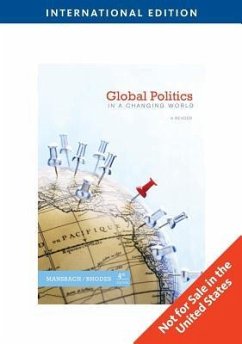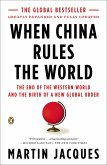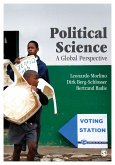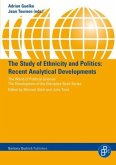- Broschiertes Buch
- Merkliste
- Auf die Merkliste
- Bewerten Bewerten
- Teilen
- Produkt teilen
- Produkterinnerung
- Produkterinnerung
Global Politics in a Changing World, International Edition blends conceptual writings on international relations with current events coverage from journalistic sources. Case materials in this reader are drawn from all major geographic regions in order to emphasize the global nature of post-Cold War issues. Each chapter approaches the key topics first from a scholarly/theoretical perspective, then follows with readings that present a news/current events context. The readings provide a stimulus for informed debate and discussion and encourage students to view daily events as part of a larger…mehr
Andere Kunden interessierten sich auch für
![When China Rules the World When China Rules the World]() Martin JacquesWhen China Rules the World16,99 €
Martin JacquesWhen China Rules the World16,99 €![Postkoloniale Politikwissenschaft Postkoloniale Politikwissenschaft]() Postkoloniale Politikwissenschaft29,99 €
Postkoloniale Politikwissenschaft29,99 €![Principles of Politics Principles of Politics]() Joe OppenheimerPrinciples of Politics25,99 €
Joe OppenheimerPrinciples of Politics25,99 €![Political Science Political Science]() Leonardo A. MorlinoPolitical Science38,99 €
Leonardo A. MorlinoPolitical Science38,99 €![Land Power Land Power]() Michael AlbertusLand Power27,99 €
Michael AlbertusLand Power27,99 €![The Study of Ethnicity and Politics - Recent Analytical Developments The Study of Ethnicity and Politics - Recent Analytical Developments]() The Study of Ethnicity and PoliticsThe Study of Ethnicity and Politics - Recent Analytical Developments19,90 €
The Study of Ethnicity and PoliticsThe Study of Ethnicity and Politics - Recent Analytical Developments19,90 €![The Palgrave Macmillan Dictionary of Political Thought The Palgrave Macmillan Dictionary of Political Thought]() Roger ScrutonThe Palgrave Macmillan Dictionary of Political Thought37,99 €
Roger ScrutonThe Palgrave Macmillan Dictionary of Political Thought37,99 €-
-
-
Global Politics in a Changing World, International Edition blends conceptual writings on international relations with current events coverage from journalistic sources. Case materials in this reader are drawn from all major geographic regions in order to emphasize the global nature of post-Cold War issues. Each chapter approaches the key topics first from a scholarly/theoretical perspective, then follows with readings that present a news/current events context. The readings provide a stimulus for informed debate and discussion and encourage students to view daily events as part of a larger process of change. This unique reader goes beyond the traditional concept of international relations, defined simply as interactions between states. Covering all players in the modern global political scene, topics in the text range from international companies and intergovernmental organizations to traditional states and terrorist organizations. To discuss these varied influences in world politics, the authors have carefully selected a mix of readings that includes journal articles on current events and classic discussions of international relations.
Hinweis: Dieser Artikel kann nur an eine deutsche Lieferadresse ausgeliefert werden.
Hinweis: Dieser Artikel kann nur an eine deutsche Lieferadresse ausgeliefert werden.
Produktdetails
- Produktdetails
- Verlag: Cengage Learning EMEA / Wadsworth
- New
- Seitenzahl: 528
- Erscheinungstermin: Juni 2009
- Englisch
- Abmessung: 235mm
- Gewicht: 716g
- ISBN-13: 9781424069040
- ISBN-10: 1424069041
- Artikelnr.: 33200418
- Herstellerkennzeichnung
- Produktsicherheitsverantwortliche/r
- Europaallee 1
- 36244 Bad Hersfeld
- gpsr@libri.de
- Verlag: Cengage Learning EMEA / Wadsworth
- New
- Seitenzahl: 528
- Erscheinungstermin: Juni 2009
- Englisch
- Abmessung: 235mm
- Gewicht: 716g
- ISBN-13: 9781424069040
- ISBN-10: 1424069041
- Artikelnr.: 33200418
- Herstellerkennzeichnung
- Produktsicherheitsverantwortliche/r
- Europaallee 1
- 36244 Bad Hersfeld
- gpsr@libri.de
1. Continuity and Change in Global Politics.
Turbulence in World Politics: A Theory of Change and Continuity, James N. Rosenau. Bloggers May Be the Real Opposition, The Economist. Sovereignty, Borders, and Real Life. Why the World Isn''t Flat, Pankaj Ghemawat. Our Borderless World, Moisés Naím. Cities Mesh Across Blurry Border, Despite Physical Barrier, Marc Lacey. The Twenty-First-Century State? We Need Rules for Sovereign Funds, Jeffrey Garten.
Part I: THE CHANGING NATURE OF WAR.
2. Out of Control? The Rise of Postmodern War and Terrorism.
The New Wars, Herfried Münkler. The Global Menace of Local Strife, The Economist. Targeting the Innocent: Terrorism. Strategies of Terrorism, Andrew H. Kydd and Barbara F. Walter. Hiring an Army: Mercenaries and Private Military Contractors. The Private Surge, Steve Fainaru. War by Electron: Cyberwar. Cyber Attack and Vexes Estonia, Poses Debate, Christopher Rhoads. A World Wide Web of Terror, The Economist.
3. Weapons of Mass Destruction: Thinking About the Unthinkable, Again.
The New Threat of Mass Destruction, Richard K. Betts. Nuclear Proliferation. Bombs Away, The Economist. Ballistic Missile Defense. U.S. Missile Defense, International Institute for Strategic Studies. The Consequences of a "Limited" Nuclear War. Climate Effects of Nuclear War, Alan Robock. Biological Weapons. With Custom-Built Pathogens Come New Fears, Joby Warrick.
Part II: DISINTEGRATION AND INTEGRATION IN TODAY''S WORLD.
4. Democracy: A Global Institution?
History Is Still Going Our Way, Francis Fukuyama. The Return of Authoritarian Great Powers, Azar Gat. Dictating Democracy. America''s Crusade, Edward Rhodes. America''s Crisis of Legitimacy, Robert Kagan. Religion and Democracy. Why God Is Winning, Timothy Samuel Shah and Monica Duffy Toft. Islamists Suffer as Freedom Slips Down the Mideast Agenda, Heba Saleh.5. Failed States.
Failed States in a World of Terror, Robert I. Rotberg. Africa''s Revolutionary Deficit, Jeremy M. Weinstein. The Coming Anarchy, Robert D. Kaplan. Haiti. UN Troops Fight Haiti''s Gangs One Battered Street at a Time, Marc Lacey. Iraq. The 10th Circle, Terry McCarthy.
6. Solving Shared Problems: Intergovernmental Organizations.
The United Nations. International Organizations: Perspectives on Governance in the Twenty-first Century, Kelly-Kate S. Pease. The United Nations, The Economist. The International Monetary Fund. The IMF and Democratic Governance, Devesh Kapur and Moisés Naím. The European Union. Standard Bearer: How the European Union Exports Its Laws, Tobias Buck.
7. Ties That Bind: The Rise of Transnational Institutions.
Power Shift, Jessica T. Mathews. Learning to Live with NGOs, P. J. Simmons. NGOs and States. NGOs: Sins of the Secular Missionaries, The Economist. What Is a Gongo? Moisés Naím. TNCs. Mountain of Gold Leaves a River of Waste, Jane Perlez and Raymond Bonner. NGOs and TNCs. How a Global Web of Activists Gives Cooke Problems in India, Steve Stecklow. The NGO-TNC-State Nexus. More than the Sum of the Parts, Sarah Murray.
8. Thy Brother''s Keeper: Human Rights and International Law in the Postinternational Era.
Are Human Rights Universal? Thomas M. Franck. Taming Leviathan, The Economist. An International Criminal Court. If Not Peace, Then Justice, Elizabeth Rubin.
Part III: A NEW SECURITY AGENDA IN A GLOBABLIZED WORLD.
9. The Problem of Soft Security: Crime, Disease, and Dangerous Products in a Globalized World. Redefining Security. Human Security in a Globalized World, Rob McRae. Crime. The Five Wars of Globalization, Moisés Naím. In Afghanistan, Heroin Trade Soars Despite U.S. Aid, Philip Shiakin and David Crawford. Disease. Together, in Sickness and in Health, Natalie Angier. Dangerous Products. Dangers for Both Pets and People, Ariana Eunjung Cha.
10. Managing a Global Economy.
The Challenge of Global Capitalism, Robert Gilpin. Economic Globalization. In the Shadow of Prosperity, The Economist. How Trade Barriers Keep Africans Adrift, Jul
Turbulence in World Politics: A Theory of Change and Continuity, James N. Rosenau. Bloggers May Be the Real Opposition, The Economist. Sovereignty, Borders, and Real Life. Why the World Isn''t Flat, Pankaj Ghemawat. Our Borderless World, Moisés Naím. Cities Mesh Across Blurry Border, Despite Physical Barrier, Marc Lacey. The Twenty-First-Century State? We Need Rules for Sovereign Funds, Jeffrey Garten.
Part I: THE CHANGING NATURE OF WAR.
2. Out of Control? The Rise of Postmodern War and Terrorism.
The New Wars, Herfried Münkler. The Global Menace of Local Strife, The Economist. Targeting the Innocent: Terrorism. Strategies of Terrorism, Andrew H. Kydd and Barbara F. Walter. Hiring an Army: Mercenaries and Private Military Contractors. The Private Surge, Steve Fainaru. War by Electron: Cyberwar. Cyber Attack and Vexes Estonia, Poses Debate, Christopher Rhoads. A World Wide Web of Terror, The Economist.
3. Weapons of Mass Destruction: Thinking About the Unthinkable, Again.
The New Threat of Mass Destruction, Richard K. Betts. Nuclear Proliferation. Bombs Away, The Economist. Ballistic Missile Defense. U.S. Missile Defense, International Institute for Strategic Studies. The Consequences of a "Limited" Nuclear War. Climate Effects of Nuclear War, Alan Robock. Biological Weapons. With Custom-Built Pathogens Come New Fears, Joby Warrick.
Part II: DISINTEGRATION AND INTEGRATION IN TODAY''S WORLD.
4. Democracy: A Global Institution?
History Is Still Going Our Way, Francis Fukuyama. The Return of Authoritarian Great Powers, Azar Gat. Dictating Democracy. America''s Crusade, Edward Rhodes. America''s Crisis of Legitimacy, Robert Kagan. Religion and Democracy. Why God Is Winning, Timothy Samuel Shah and Monica Duffy Toft. Islamists Suffer as Freedom Slips Down the Mideast Agenda, Heba Saleh.5. Failed States.
Failed States in a World of Terror, Robert I. Rotberg. Africa''s Revolutionary Deficit, Jeremy M. Weinstein. The Coming Anarchy, Robert D. Kaplan. Haiti. UN Troops Fight Haiti''s Gangs One Battered Street at a Time, Marc Lacey. Iraq. The 10th Circle, Terry McCarthy.
6. Solving Shared Problems: Intergovernmental Organizations.
The United Nations. International Organizations: Perspectives on Governance in the Twenty-first Century, Kelly-Kate S. Pease. The United Nations, The Economist. The International Monetary Fund. The IMF and Democratic Governance, Devesh Kapur and Moisés Naím. The European Union. Standard Bearer: How the European Union Exports Its Laws, Tobias Buck.
7. Ties That Bind: The Rise of Transnational Institutions.
Power Shift, Jessica T. Mathews. Learning to Live with NGOs, P. J. Simmons. NGOs and States. NGOs: Sins of the Secular Missionaries, The Economist. What Is a Gongo? Moisés Naím. TNCs. Mountain of Gold Leaves a River of Waste, Jane Perlez and Raymond Bonner. NGOs and TNCs. How a Global Web of Activists Gives Cooke Problems in India, Steve Stecklow. The NGO-TNC-State Nexus. More than the Sum of the Parts, Sarah Murray.
8. Thy Brother''s Keeper: Human Rights and International Law in the Postinternational Era.
Are Human Rights Universal? Thomas M. Franck. Taming Leviathan, The Economist. An International Criminal Court. If Not Peace, Then Justice, Elizabeth Rubin.
Part III: A NEW SECURITY AGENDA IN A GLOBABLIZED WORLD.
9. The Problem of Soft Security: Crime, Disease, and Dangerous Products in a Globalized World. Redefining Security. Human Security in a Globalized World, Rob McRae. Crime. The Five Wars of Globalization, Moisés Naím. In Afghanistan, Heroin Trade Soars Despite U.S. Aid, Philip Shiakin and David Crawford. Disease. Together, in Sickness and in Health, Natalie Angier. Dangerous Products. Dangers for Both Pets and People, Ariana Eunjung Cha.
10. Managing a Global Economy.
The Challenge of Global Capitalism, Robert Gilpin. Economic Globalization. In the Shadow of Prosperity, The Economist. How Trade Barriers Keep Africans Adrift, Jul
1. Continuity and Change in Global Politics.
Turbulence in World Politics: A Theory of Change and Continuity, James N. Rosenau. Bloggers May Be the Real Opposition, The Economist. Sovereignty, Borders, and Real Life. Why the World Isn''t Flat, Pankaj Ghemawat. Our Borderless World, Moisés Naím. Cities Mesh Across Blurry Border, Despite Physical Barrier, Marc Lacey. The Twenty-First-Century State? We Need Rules for Sovereign Funds, Jeffrey Garten.
Part I: THE CHANGING NATURE OF WAR.
2. Out of Control? The Rise of Postmodern War and Terrorism.
The New Wars, Herfried Münkler. The Global Menace of Local Strife, The Economist. Targeting the Innocent: Terrorism. Strategies of Terrorism, Andrew H. Kydd and Barbara F. Walter. Hiring an Army: Mercenaries and Private Military Contractors. The Private Surge, Steve Fainaru. War by Electron: Cyberwar. Cyber Attack and Vexes Estonia, Poses Debate, Christopher Rhoads. A World Wide Web of Terror, The Economist.
3. Weapons of Mass Destruction: Thinking About the Unthinkable, Again.
The New Threat of Mass Destruction, Richard K. Betts. Nuclear Proliferation. Bombs Away, The Economist. Ballistic Missile Defense. U.S. Missile Defense, International Institute for Strategic Studies. The Consequences of a "Limited" Nuclear War. Climate Effects of Nuclear War, Alan Robock. Biological Weapons. With Custom-Built Pathogens Come New Fears, Joby Warrick.
Part II: DISINTEGRATION AND INTEGRATION IN TODAY''S WORLD.
4. Democracy: A Global Institution?
History Is Still Going Our Way, Francis Fukuyama. The Return of Authoritarian Great Powers, Azar Gat. Dictating Democracy. America''s Crusade, Edward Rhodes. America''s Crisis of Legitimacy, Robert Kagan. Religion and Democracy. Why God Is Winning, Timothy Samuel Shah and Monica Duffy Toft. Islamists Suffer as Freedom Slips Down the Mideast Agenda, Heba Saleh.5. Failed States.
Failed States in a World of Terror, Robert I. Rotberg. Africa''s Revolutionary Deficit, Jeremy M. Weinstein. The Coming Anarchy, Robert D. Kaplan. Haiti. UN Troops Fight Haiti''s Gangs One Battered Street at a Time, Marc Lacey. Iraq. The 10th Circle, Terry McCarthy.
6. Solving Shared Problems: Intergovernmental Organizations.
The United Nations. International Organizations: Perspectives on Governance in the Twenty-first Century, Kelly-Kate S. Pease. The United Nations, The Economist. The International Monetary Fund. The IMF and Democratic Governance, Devesh Kapur and Moisés Naím. The European Union. Standard Bearer: How the European Union Exports Its Laws, Tobias Buck.
7. Ties That Bind: The Rise of Transnational Institutions.
Power Shift, Jessica T. Mathews. Learning to Live with NGOs, P. J. Simmons. NGOs and States. NGOs: Sins of the Secular Missionaries, The Economist. What Is a Gongo? Moisés Naím. TNCs. Mountain of Gold Leaves a River of Waste, Jane Perlez and Raymond Bonner. NGOs and TNCs. How a Global Web of Activists Gives Cooke Problems in India, Steve Stecklow. The NGO-TNC-State Nexus. More than the Sum of the Parts, Sarah Murray.
8. Thy Brother''s Keeper: Human Rights and International Law in the Postinternational Era.
Are Human Rights Universal? Thomas M. Franck. Taming Leviathan, The Economist. An International Criminal Court. If Not Peace, Then Justice, Elizabeth Rubin.
Part III: A NEW SECURITY AGENDA IN A GLOBABLIZED WORLD.
9. The Problem of Soft Security: Crime, Disease, and Dangerous Products in a Globalized World. Redefining Security. Human Security in a Globalized World, Rob McRae. Crime. The Five Wars of Globalization, Moisés Naím. In Afghanistan, Heroin Trade Soars Despite U.S. Aid, Philip Shiakin and David Crawford. Disease. Together, in Sickness and in Health, Natalie Angier. Dangerous Products. Dangers for Both Pets and People, Ariana Eunjung Cha.
10. Managing a Global Economy.
The Challenge of Global Capitalism, Robert Gilpin. Economic Globalization. In the Shadow of Prosperity, The Economist. How Trade Barriers Keep Africans Adrift, Jul
Turbulence in World Politics: A Theory of Change and Continuity, James N. Rosenau. Bloggers May Be the Real Opposition, The Economist. Sovereignty, Borders, and Real Life. Why the World Isn''t Flat, Pankaj Ghemawat. Our Borderless World, Moisés Naím. Cities Mesh Across Blurry Border, Despite Physical Barrier, Marc Lacey. The Twenty-First-Century State? We Need Rules for Sovereign Funds, Jeffrey Garten.
Part I: THE CHANGING NATURE OF WAR.
2. Out of Control? The Rise of Postmodern War and Terrorism.
The New Wars, Herfried Münkler. The Global Menace of Local Strife, The Economist. Targeting the Innocent: Terrorism. Strategies of Terrorism, Andrew H. Kydd and Barbara F. Walter. Hiring an Army: Mercenaries and Private Military Contractors. The Private Surge, Steve Fainaru. War by Electron: Cyberwar. Cyber Attack and Vexes Estonia, Poses Debate, Christopher Rhoads. A World Wide Web of Terror, The Economist.
3. Weapons of Mass Destruction: Thinking About the Unthinkable, Again.
The New Threat of Mass Destruction, Richard K. Betts. Nuclear Proliferation. Bombs Away, The Economist. Ballistic Missile Defense. U.S. Missile Defense, International Institute for Strategic Studies. The Consequences of a "Limited" Nuclear War. Climate Effects of Nuclear War, Alan Robock. Biological Weapons. With Custom-Built Pathogens Come New Fears, Joby Warrick.
Part II: DISINTEGRATION AND INTEGRATION IN TODAY''S WORLD.
4. Democracy: A Global Institution?
History Is Still Going Our Way, Francis Fukuyama. The Return of Authoritarian Great Powers, Azar Gat. Dictating Democracy. America''s Crusade, Edward Rhodes. America''s Crisis of Legitimacy, Robert Kagan. Religion and Democracy. Why God Is Winning, Timothy Samuel Shah and Monica Duffy Toft. Islamists Suffer as Freedom Slips Down the Mideast Agenda, Heba Saleh.5. Failed States.
Failed States in a World of Terror, Robert I. Rotberg. Africa''s Revolutionary Deficit, Jeremy M. Weinstein. The Coming Anarchy, Robert D. Kaplan. Haiti. UN Troops Fight Haiti''s Gangs One Battered Street at a Time, Marc Lacey. Iraq. The 10th Circle, Terry McCarthy.
6. Solving Shared Problems: Intergovernmental Organizations.
The United Nations. International Organizations: Perspectives on Governance in the Twenty-first Century, Kelly-Kate S. Pease. The United Nations, The Economist. The International Monetary Fund. The IMF and Democratic Governance, Devesh Kapur and Moisés Naím. The European Union. Standard Bearer: How the European Union Exports Its Laws, Tobias Buck.
7. Ties That Bind: The Rise of Transnational Institutions.
Power Shift, Jessica T. Mathews. Learning to Live with NGOs, P. J. Simmons. NGOs and States. NGOs: Sins of the Secular Missionaries, The Economist. What Is a Gongo? Moisés Naím. TNCs. Mountain of Gold Leaves a River of Waste, Jane Perlez and Raymond Bonner. NGOs and TNCs. How a Global Web of Activists Gives Cooke Problems in India, Steve Stecklow. The NGO-TNC-State Nexus. More than the Sum of the Parts, Sarah Murray.
8. Thy Brother''s Keeper: Human Rights and International Law in the Postinternational Era.
Are Human Rights Universal? Thomas M. Franck. Taming Leviathan, The Economist. An International Criminal Court. If Not Peace, Then Justice, Elizabeth Rubin.
Part III: A NEW SECURITY AGENDA IN A GLOBABLIZED WORLD.
9. The Problem of Soft Security: Crime, Disease, and Dangerous Products in a Globalized World. Redefining Security. Human Security in a Globalized World, Rob McRae. Crime. The Five Wars of Globalization, Moisés Naím. In Afghanistan, Heroin Trade Soars Despite U.S. Aid, Philip Shiakin and David Crawford. Disease. Together, in Sickness and in Health, Natalie Angier. Dangerous Products. Dangers for Both Pets and People, Ariana Eunjung Cha.
10. Managing a Global Economy.
The Challenge of Global Capitalism, Robert Gilpin. Economic Globalization. In the Shadow of Prosperity, The Economist. How Trade Barriers Keep Africans Adrift, Jul








